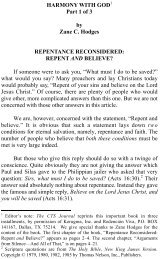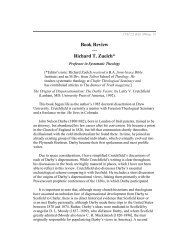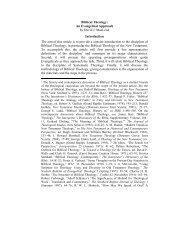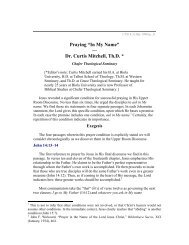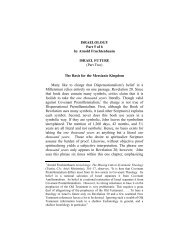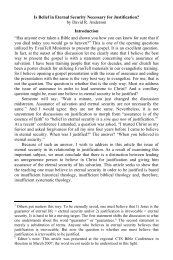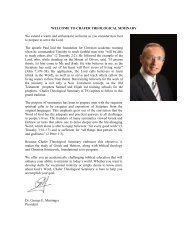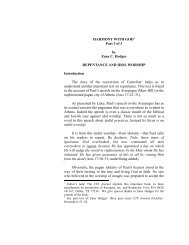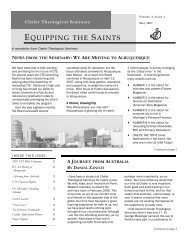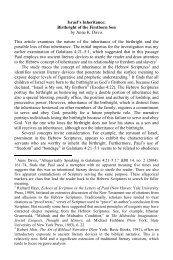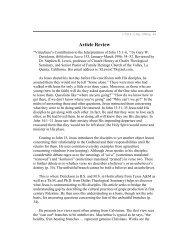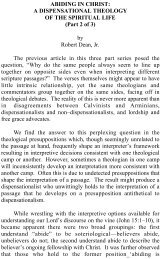JAMES 2:24 - Chafer Theological Seminary
JAMES 2:24 - Chafer Theological Seminary
JAMES 2:24 - Chafer Theological Seminary
You also want an ePaper? Increase the reach of your titles
YUMPU automatically turns print PDFs into web optimized ePapers that Google loves.
James 2:<strong>24</strong>: Retranslation Required 5<br />
Lexical Study<br />
The outline of BDAG’s pertinent adjectival uses follows:<br />
1. adj.—a. only, alone—a. used w. [stative] verbs. . . . 3<br />
b. used w. a noun [as an attributive adjective]. . . . 4<br />
g. w. a negative and w. ajllav foll. . . . 5<br />
d. movno" qeov". . . . the only God. . . .<br />
b. alone, deserted, helpless. . . . 6<br />
c. isolated, by itself. . . . 7<br />
Each of BDAG’s adjectival classifications involves attributive<br />
or predicate adjectives. Both require the adjective and its<br />
substantive to agree in case, number, and gender. Only the<br />
accusative-neuter-singular form (monon) can function adverbially.<br />
3 Daniel B. Wallace, Greek Grammar Beyond the Basics: An Exegetical Syntax<br />
of the New Testament (Grand Rapids: Zondervan, 1996), 40, explains that “the<br />
passives of some transitive verbs” act as stative verbs in predicate nominative<br />
clauses. Robertson, Grammar, 656, “As further interesting examples of the<br />
predicate adjective, note. . . movno" (Lu. <strong>24</strong>:8; cf. Mt. 14:23), etc.”<br />
4 BDAG, 658, lists John 6:22 as an example. Monos here is attributive: His<br />
disciples alone had gone away.<br />
5 Ibid., 658, cites Matthew 4:4: Man shall not live by bread alone, but by every<br />
word that proceeds from the mouth of God. F. Blass and A. Debrunner, A Greek<br />
Grammar of the New Testament and Other Early Christian Literature, trans. and<br />
rev. Robert W. Funk (Chicago: University of Chicago Press, 1961), 233,<br />
“Ouj. . . ajlla also means ‘not so much. . . as’ in which the first element is not<br />
entirely negated, but only toned down. . . .” Man lives by more than bread alone.<br />
6 This is a double accusative of object and complement. Wallace, Grammar,<br />
182, says that in this construction “one accusative substantive is the direct object<br />
of the verb and the other accusative (either noun, adjective, participle, or<br />
infinitive) complements the object in that it predicates something about it. The<br />
complement may be substantival or adjectival [emphasis mine].” Ibid., 184,<br />
indicates that a complementary adjective here is always a predicate adjective.<br />
Ibid., also says, “. . .one should normally translate the construction with ‘as,’ ‘to<br />
be,’ or ‘namely’ between the two accusatives.” BDAG, 659, gives John 8:29 as<br />
an example: The Father has not left Me [to be] alone.<br />
7 BDAG’s only example is John 12:<strong>24</strong>: it [a grain of wheat] remains alone. This<br />
resembles a predicate adjective. The verb menw (“remains”) may function as a<br />
stative verb (cf. Wallace, Grammar, 40, n. 11).



